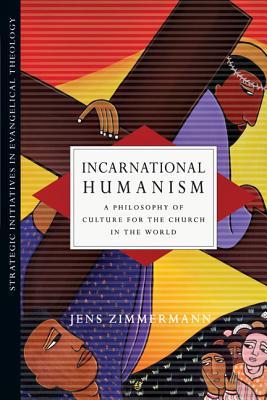Jens Zimmermann: Incarnational Humanism
 Jens Zimmermann, Incarnational Humanism: A Philosophy of Culture for the Church in the World, Strategic Initiatives in Evangelical Theology(Downers Grove, Illinois: InterVarsity Press, 2012), 357 pages, ISBN 9780830839032.
Jens Zimmermann, Incarnational Humanism: A Philosophy of Culture for the Church in the World, Strategic Initiatives in Evangelical Theology(Downers Grove, Illinois: InterVarsity Press, 2012), 357 pages, ISBN 9780830839032.
Trinity Western University (Langley, British Columbia) Canadian research chair of Interpretation, Religion and Culture, Jens Zimmermann, argues that mainstream discourses on humanism are grounded in the religious reality of Christianity. He further proposes to read Christian humanism as the root of the western cultural heritage. With sources from the Greco-Roman antecedents, patristic, medieval, renaissance, and post-renaissance thinkers (chapters two and three) he corrects the dominant reading of humanism as an anti-Christian project of secularism in western intellectual history, especially found in the works of Kant, Hegel, Nietzsche, Martin Heidegger, Levinas, and Gianni Vattimo. These later thinkers were the focus of chapters four and five, even as Zimmermann also re-reads Marion’s phenomenology in light of Thomist and Barthian ontological emphasis, and with insights also to correct the works of contemporary philosophical hermeneuticians such as Richard Kearney and John Caputo in chapter five. Significant personalities mentioned in chapters two and three include Jesus Christ, Augustine, Nicholas of Cusa, Vico, Dilthey, and Gadamer. Chapter one provides an overlay of the current malaise of secularized western culture and its recent continental proposal about the return of religion, and argues that the exhaustion of secularism is because western civilization has cast aside its Christian roots. Theologians of culture would want to pay attention to the final chapter whereby he explains how transcendence and immanence meet as God’s presence in the world and in the church, with the Eucharist and the Sacrament of the Word understood as the heart of the Church and of incarnational humanism. Apologists and church leaders will find this publication a helpful reference, if they are not familiar with the primary canvass of secular humanism in western philosophy. Students in the philosophy of culture, cultural theological anthropology, or the ideological engagement of gospel and culture may find the introduction a good preliminary review. I suspect that scholars of religious interdisciplinarity would find the publication too concise, unless they read it with its companion-volume, Humanism and Religion (Oxford University Pres, 2012).
Mainstream discourses on humanism are grounded in the religious reality of Christianity.
Category: In Depth


